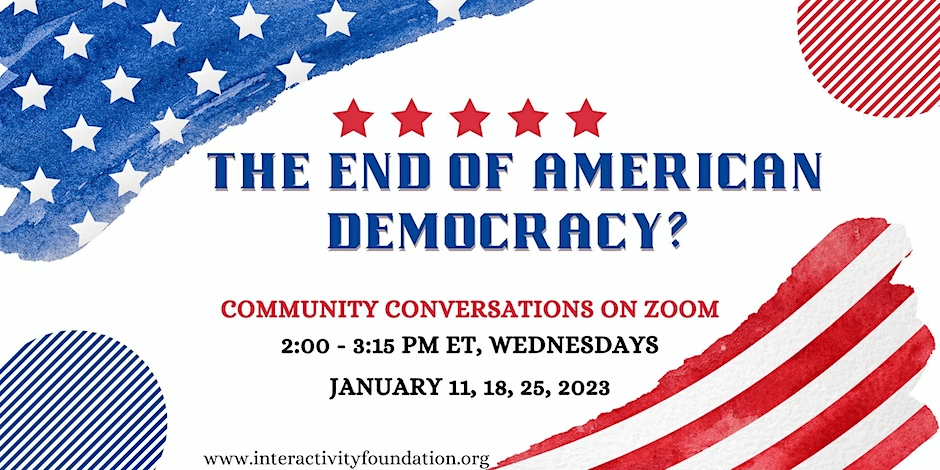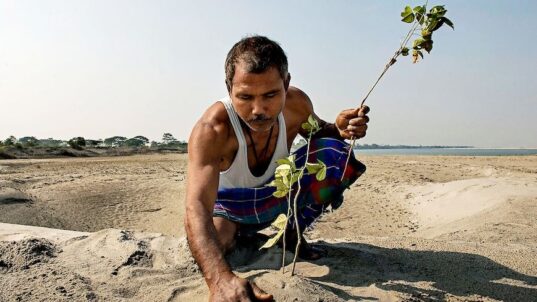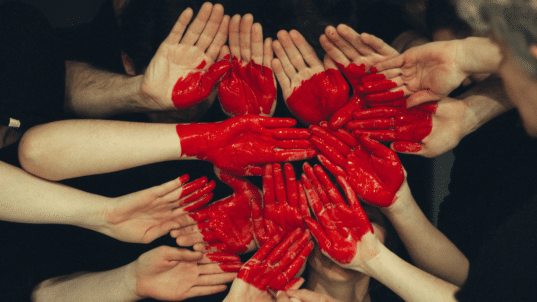
What are the particular structures, institution, or processes that we need for democracy to work and why?
Where do we see these formal aspects of democracy to be under threat? And how could we help strengthen or re-envision these structures, institutions, or processes to better resist these threats? These and other questions were explored and expanded on by participants last Wednesday in our 2nd session of this three-part community conversation series on The End of American Democracy. Below we have summarized some of the different structures, institutions, and processes discussed by participants in this 2nd session, together with key challenges or threats to them, and some different ideas for strengthening or sustaining them.
For our third and final session, we’ll ask participants to explore the broader social and cultural aspects of democracy. What are the values, beliefs, or mindsets that are at the heart of democracy? We framed this series as the “End of American Democracy.” And while the “end” can mean democracy’s loss or demise, it can also mean its purpose or goal. What are the goals or purposes that motivate, or should motivate American democracy? What should a culture of democracy be aiming at? Please join us on Wednesday, January 25, 2023 at 2:00 PM (ET) for this final session by registering via Eventbrite (scroll to select the January 25th session).
What institutions or processes are essential for democracy to work–and why?
- Divided and limited government with a system of checks and balances across multiple functions (legislative, executive/regulatory, judicial) and levels (federal, state, local) to avoid consolidation of power
- Representative legislative institutions to develop, deliberate, and decide on public policy (Congress and state legislatures)
- Executive branch to carry out public policy and subject to constitutional limits–elections with term limits, limited powers by other branches
- An independent, nonpartisan judiciary to–
- Interpret the law, decide constitutional issues–protect individual rights, maintain freedoms
- Ensure equal treatment, due process, fundamental fairness and equal justice for all, resolving disputes in a fair manner
- A working balance of majority rule with minority rights: balancing proportional representation and majority rule with the protection of minority interests as well
- A nonpartisan law enforcement system subject to civilian control and oversight and procedural rules to keep the peace, equally enforce the law, and protect all citizens
- A military that is nonpartisan and civilian controlled
- Tax system to fund the government and pay for public services
- A nonpartisan regulatory state to fairly and efficiently administer government policies free of corruption, with a civil service system to protect the implementation of public policy from corrupt influences
- Strong, healthy communities and local democratic governance as a key building block of democracy, where citizens can interact and engage face-to-face with their government, their neighbors, and the practices of democracy.
- Individual civil rights and liberties that are interpreted fairly and equally enforced, including: freedom of speech, conscience, worship, press, peaceful protest, petition, judicial oversight of searches, seizures, and arrests warrants, privacy, due process, equal protection, retention of other rights, etc.
- Nonviolence and civility: norms and processes that support nonviolence and civility in public discourse, public deliberation, and governance, including–
- Peaceful transitions of power
- Process rules for civil debate and deliberation
- Policies and processes that encourage and support public engagement and participation
- Treating political opposition and opponents with respect
- An education system that teaches productive and respectful participation and the skills of democratic citizenship, including how to engage with others with whom you disagree
- Free and fair elections with processes that are open, accessible, widely trusted, efficient, free from the threat of violence, and that seek to–
- Protect and expand voting rights and access for all citizens
- Regulate the unequal role of money in campaigns–in determining who runs for office and how
- Bar partisan gerrymandering and provide for non-partisan re-districting to promote proportional representation
- Good Media & Information. Publicly responsible media systems that do more than divert or entertain
- Independent outlets that help inform and illuminate public issues, and that hold public figures, and organizations accountable
- They expose corruption and provide transparency and accountability
- They provide multiple and alternative points of view while avoiding both-sides-ism, horse-race coverage, and conspiracy theories
- They seek the truth, or closer understandings of it, and work to deter and discourage mis- and disinformation rather than amplifying it
- Include well funded public information sources, like public media and libraries
- High quality public education systems for K-college to create an informed citizenry
- Accessible, available for all throughout life
- Teaches civil engagement, respect for difference, civics, history, philosophy, economics, media literacy, etc.
- Helps form and sustain a culture of collaboration across differences and other democratic practices
- Role of religion, public philosophy & ethics – Institutions that–
- support the development of the public or common good along with individual rights
- support participation, respect, and shared responsibility, encouraging public service or volunteerism
- develop respect for equality across difference
- support norms promoting ethical behavior in our public or professional lives, encouraging a focus on the public good rather than private gain
- help to develop broad agreement on certain essential values of democracy and a sense of public trust
- An economic system that supports rather than undermines democracy
- The economic system should meet the basic material needs of citizens, with a base levels of housing, food, health care, education, childcare, and income so that citizens have the capacity to engage on public matters and so they’re not constantly threatened with economic insecurity
- An economic system that encourages growth, innovation, and individual initiative, while widely sharing the benefits of economic growth
- It should be sufficiently regulated to protect consumers, the environment, and the public good
- An informed, educated, and engaged citizenry, with citizens who support the common good (resisting efforts to undermine it), engage in public or community service, and stay informed about public matters
- A healthy civil society that respects difference, engages, builds trust, plays fair, speaks and acts responsibly, discourages violence, and defends democratic practices
- Healthy families (of all types) that can nurture and support each other and the common good as well
- Non-governmental organizations can help to mediate between citizens and government, such as philanthropies, commerce or trade organizations, faith-based organizations, unions, and advocacy organizations
- Public infrastructure for civil society, such as public meeting places, as well as publicly accessible transportation, water, sanitation, parks and recreation, etc.
What risks or threats do you see for these institutions and processes?
- Capitalism
- Generally, the focus on individual material gain often works to turn public policy away from the public good toward private interests
- When poorly regulated, it increases economic inequality leading to growing numbers of citizens living in fear of economic collapse, making it impossible for them to consider the public good, and limiting their capacity for democratic engagement
- Money in politics enables the economically powerful to influence political leaders and steer public policy to serve their special interests rather than the public good and justice
- Lack of judicial ethics and enforcement, especially on the Supreme Court
- Obsolete, antiquated policies and processes that don’t fit the modern world, violate majority rule, and threaten public health, such as the 2nd amendment, electoral college, the filibuster, gerrymandering, etc.
- Racist policing heightens racial divisions, harms the public trust, and increases crime, making us less safe overall
- Public education is under assault
- Focusing on job training rather than the arts and humanities harms understanding and appreciation for democracy
- Local control and financing of education perpetuates growing inequalities
- Focusing on standardized testing and basic skills discourages development of critical thinking skills and the imagination needed for democracy
- Declining compensation and respect for teachers is leading to a national shortage and an ongoing national crisis in education
- Our education system is failing to adequately educate about civics and the practices, rights, and responsibilities of democratic citizenship
- Our election system is under assault
- Voter suppression by decreasing access to the vote, such as through the gutting of the Voting Rights Act, which has led to more laws and actions that disproportionately deter minority votes
- Increased Voter ID laws and more restrictive registration suppress minority, student, and low-income votes
- Increasing numbers and proximity of partisan “poll watchers” work to intimidate and decrease minority turn-out
- Gerrymandering is used to ensure that the ruling party maintains control of the legislature despite losing the popular vote, over and over
- The Big Lie, false stories of election fraud, increases voter distrust and decreases engagement
- The two-party system limits our choices to a simple binary that often fails to represent the interests of the community or individual’s policy preferences
- The money required to run for office corrupts our representative system
- Partisan religious identities–as faith communities re-sort by partisan identities they become sources of increased political division rather than supporting a democratic spirit of social harmony
- There’s a decline of personal responsibility to improve society–to do your part to fix what needs fixing
- Truth is under assault and democracy relies on truth, with obstacles like:
- The decline of publicly responsible journalism–especially with the loss of local news media
- The growth of social media that mixes entertainment with self-selected “news” and mis- or disinformation
- Media that does more harm than good by spreading more disinformation and misinformation more quickly and effectively, significantly weakening public trust in any notion of the truth or shared reality, and increasing cynicism and apathy
- Fear, censorship, and loss of free speech is a major threat to democracy
- There’s a fear of speaking up and losing one’s socio-economic position, based on the widespread sense of economic insecurity, so we have to prioritize self-interest rather than the common good
- State policies increasingly limit what educators can say in order to enforce the party line of political leaders
- Censorship and book-banning are hurting our education system, since we need to learn from our past mistakes as a democracy and to do this we need to talk about these past mistakes
- Our growing social divisions, based on compounded partisan, regional, racial and educational lines, threaten democracy by increasing the likelihood of supporting authoritarian leaders and policies to protect one’s chosen group at all costs
- Focusing on culture wars and “owning” the other side with no interest in the common good or honest engagement across differences
- There’s growing isolation of individuals, with a focus just on self-interest, which contributes to rising intolerance, fear, and the likelihood of supporting political violence
- Declining levels of public trust–in government, in political processes, in institutions, and in other citizens
- Increasing levels of incivility, intolerance, and disrespect in public and private life
- Rising levels of violence against minority groups and organizations that support them
How might we strengthen institutions to help democracy resist authoritarianism?
- Strengthen our election system by:
- Making it easier, not harder, to vote: more ballot drop boxes, expanded voting times, more voting days (early voting), more methods of voting (by mail, in person) and re-enacting the stricken provisions of the Voting Rights Act, etc.
- Getting the money out by enacting significant campaign finance reforms, such as public financing for campaigns (no individual or corporate giving), or strict limits on campaign spending, or full disclosure of all campaign donations and spending
- Enacting strict and shorter time limits on campaigns
- Providing longer terms of office for congressional representatives (currently 2 years), so they aren’t always campaigning
- Banning gerrymandering by requiring non-partisan districting everywhere
- Encouraging more “everyday” people (fewer wealthy people) to get involved and run for public office
- Broaden support for religious freedom and religious pluralism, since faith communities can play an important role in bringing together different sectors of society and thus help to support the underpinnings of democracy
- Declare a truce in the culture wars and nurture a “culture of collaboration” to be more intelligent as a group (like what this discussion is doing today) and promote practices that help us talk to one another across our differences.
- Create a “Secretary” of civic dialogue and discussion
- Build on the success of our local participatory public bodies, like town councils, where public matters are productively discussed with civility and decisions are made
- Address ethics violations in a non-partisan way: neither candidates nor elected politicians and public officials should be able to get away with lying, stealing, treason, or other significant crimes.
- There should be laws and budgets to ensure the enforcement of ethical standards and practices by an independent public body (not partisan bodies or professional organizations policing their own ethics rules)
- Provide free, universal K-college education that includes civics, history, communications, media literacy, philosophy, economics, and that focuses on both citizen rights and responsibilities, fostering the ideals of working toward the common good and defending the interests of others
- Counteract the culture of fear and increase solidarity among all citizens by providing for basic material needs–by investing in housing, health care, transportation, child care, etc. so that citizens are better able to participate in democracy and are able to consider more than simple survival
- Re-imagine what we mean by and how we measure “success” so that it means something more than individual material gain
- What if it were tied to promoting and defending the public good? What if we better, and more completely, supported public service of all types: military service, teaching, public health, counseling, coaching, mentoring, caring for the young and old…?
- Work with businesses and business leaders to get them to contribute, to support democracy, to develop broader notions of the public good for all.



